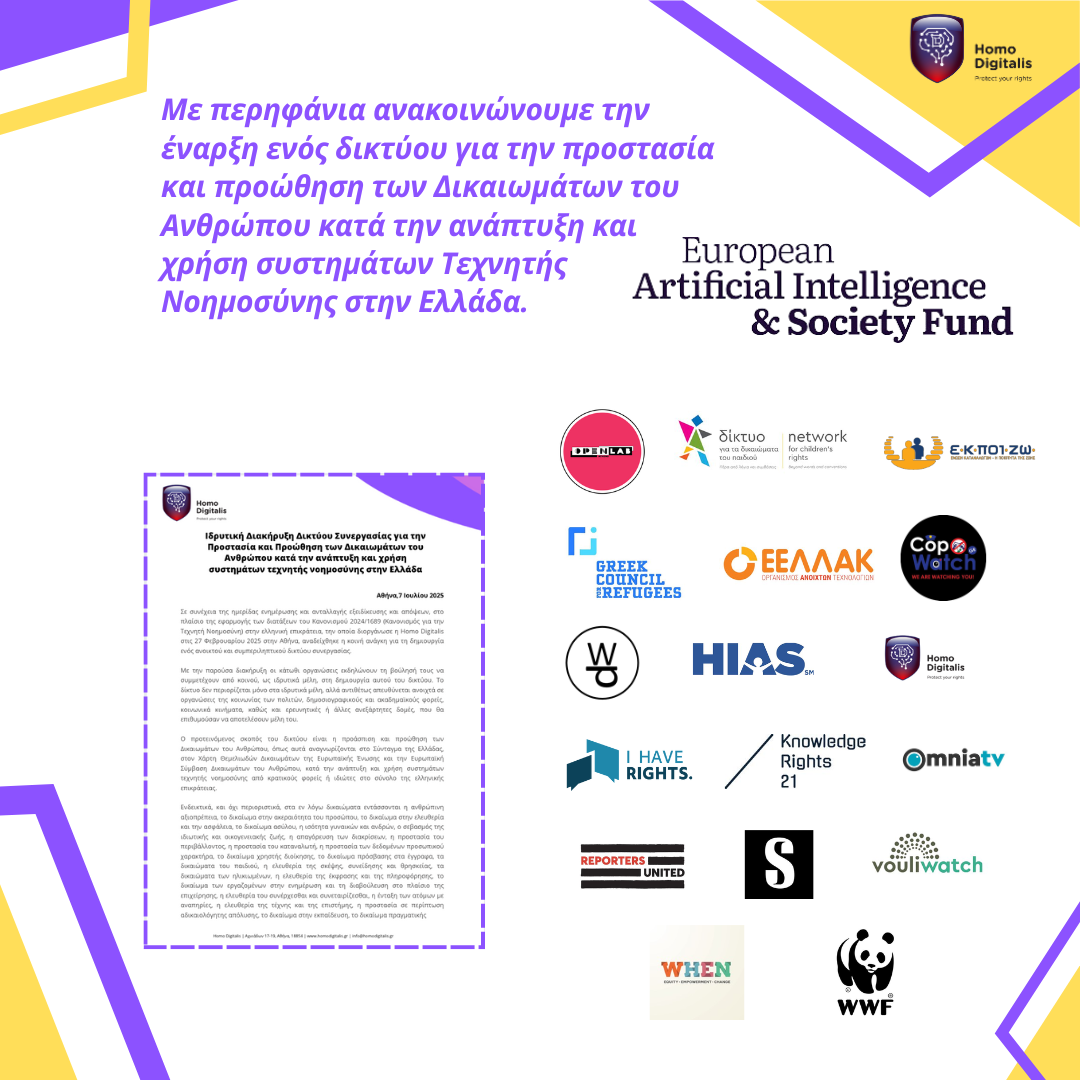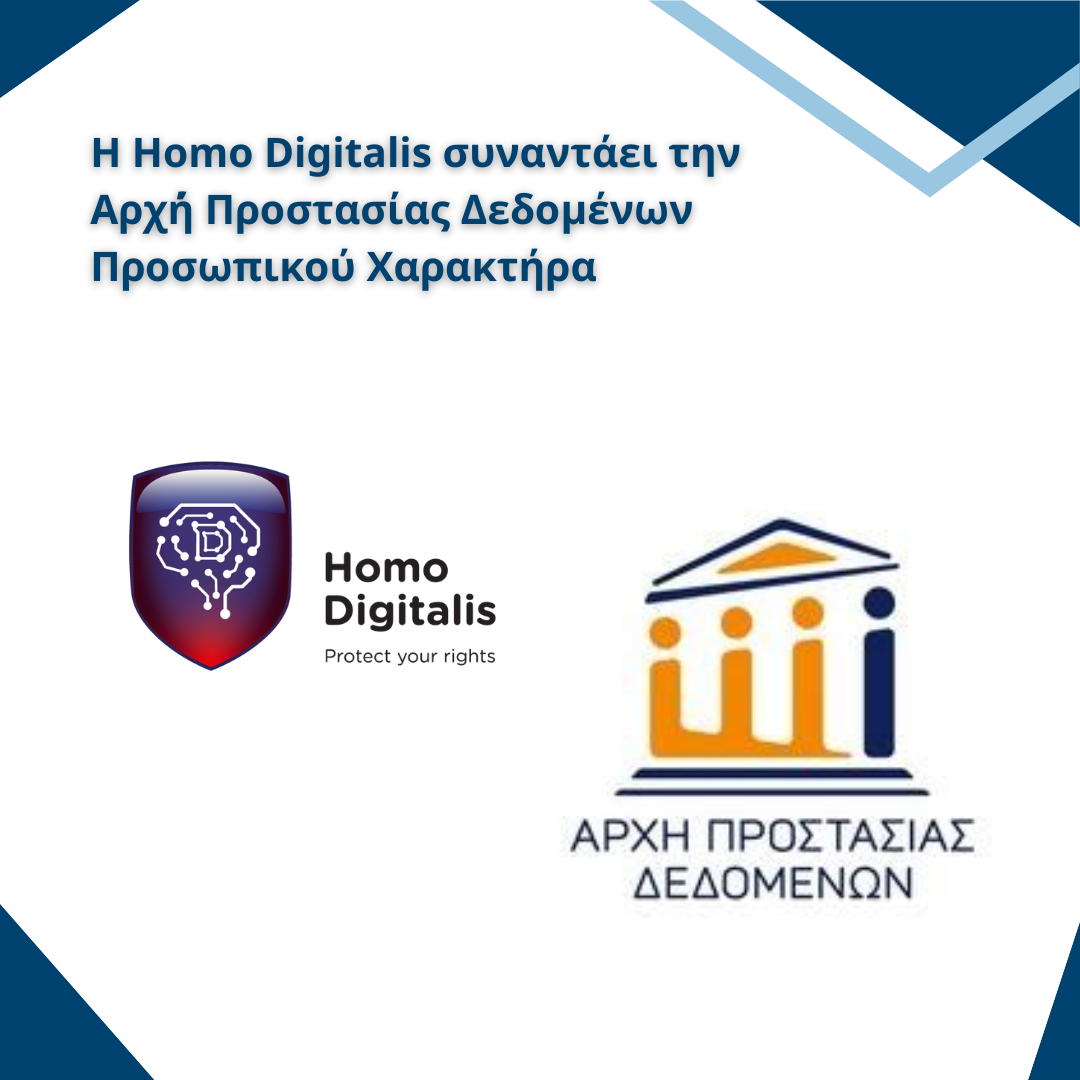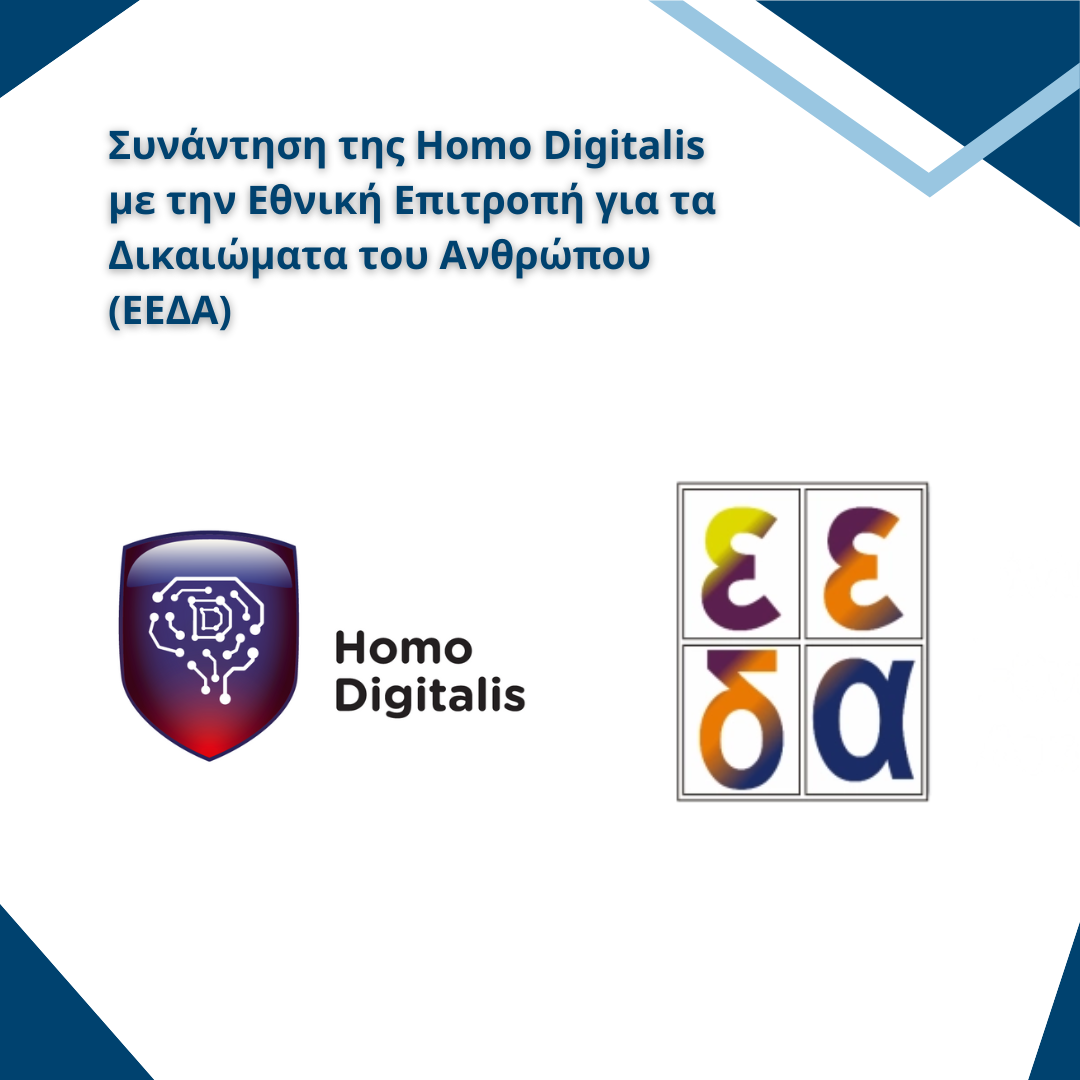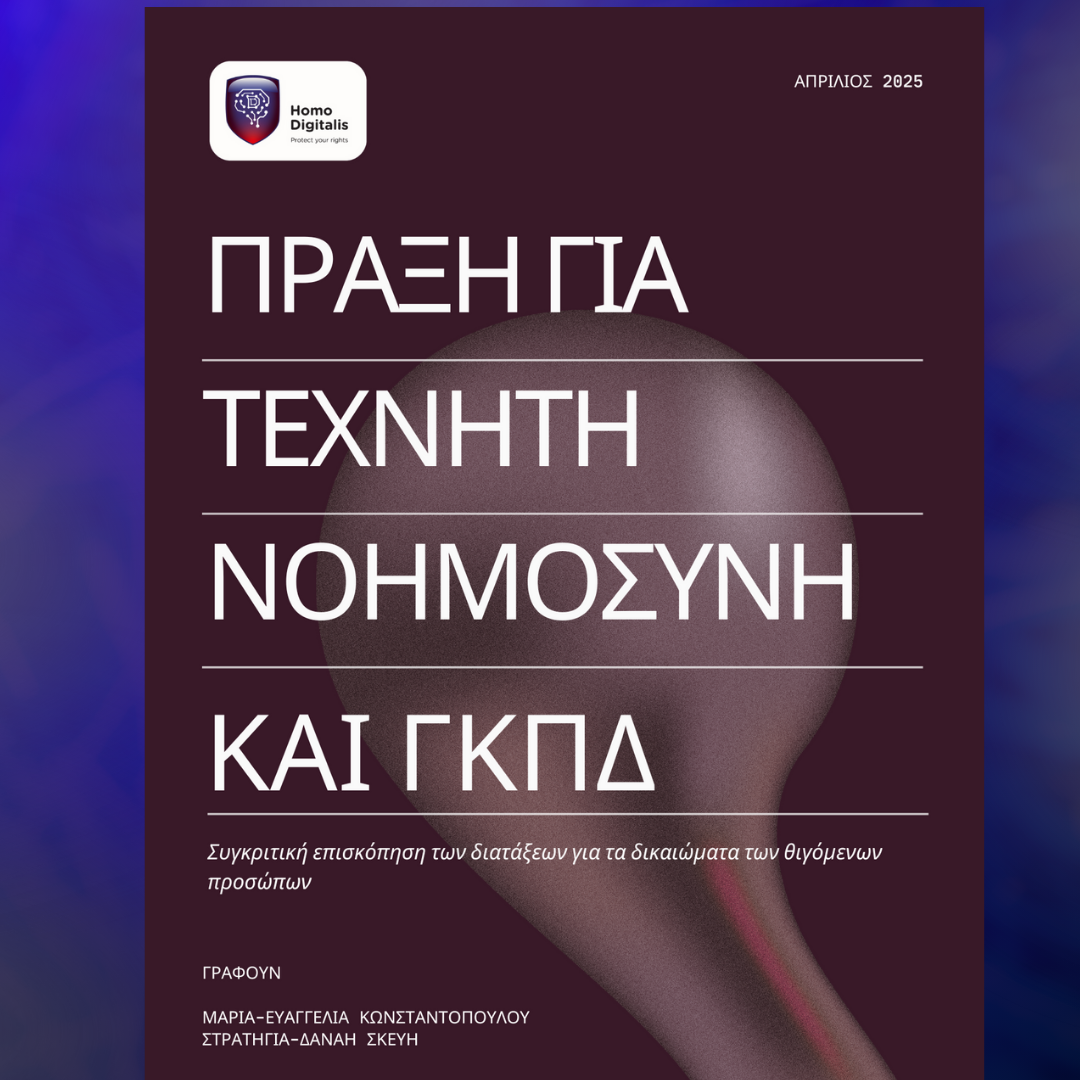Joint Declaration for the Creation of a Human Rights Protection Network in the Development & Use of AI Systems – GAIN
We are proud to announce the official launch of a collaborative and inclusive network, committed to the protection and promotion of Human Rights, Democracy, and the Rule of Law in the development and use of Artificial Intelligence systems in Greece.
The network was born out of a multi-stakeholder dialogue initiated during the February 2025 event organized by Homo Digitalis, in light of the implementation of the European Artificial Intelligence Regulation (Regulation 2024/1689).
The text of the Declaration is available here.
The mission of the network is to serve as a space for collaboration, advocacy, legal interventions, and public awareness, ensuring that AI systems in Greece comply with fundamental rights and democratic values, as enshrined in the Greek Constitution, the EU Charter of Fundamental Rights, and the European Convention on Human Rights.
The working title of the network is Greek Artificial Intelligence Network – GAIN. The founding conference, which will take place within three (3) months, will determine the network’s governance framework, guiding principles, and future direction.
The initiative is coordinated by Homo Digitalis, with the support of the European Artificial Intelligence & Society Fund (EAISF), and is open to any interested organization.
If you are interested, you can fill in the participation form here.
Founding organizations of the network (in alphabetical order):
Ανοιχτό Εργαστήριο Αθήνα | Open Lab Athens
Δίκτυο για τα Δικαιώματα του Παιδιού | Network for Children’s Rights
Ε.Κ.ΠΟΙ.ΖΩ.Ένωση Καταναλωτών «Η Ποιότητα της Ζωής» | Consumers’ Association “The Quality of Life” EKPIZO
ΕΛΛΗΝΙΚΟ ΣΥΜΒΟΥΛΙΟ ΓΙΑ ΤΟΥΣ ΠΡΟΣΦΥΓΕΣ | GREEK COUNCIL FOR REFUGEES
Οργανισμός Ανοιχτών Τεχνολογιών – ΕΕΛΛΑΚ | Open Technologies Alliance (GFOSS)
ΠΑΡΑΤΗΡΗΤΗΡΙΟ ΑΣΤΥΝΟΜΕΥΣΗΣ copwatch.gr
DATAWO
HIAS Greece
Homo Digitalis
I Have Rights
KnowledgeRights21 (National coordinator for Greece and Cyprus)
OmniaTV (iCase Κοιν.Σ.Επ.)
Reporters United
Solomon
Vouliwatch
WHEN Equity Empowerment Change
WWF Greece
Homo Digitalis meets with the Greek Ombudsman
he Greek Ombudsman welcomed the non-profit organization Homo Digitalis to his offices on June 26, 2025, for a meeting on issues related to digital rights and artificial intelligence. Among other topics, the discussion addressed the role of the Ombudsman under the European Union’s Artificial Intelligence Act, following his designation as one of the fundamental rights authorities under Article 77 of the Regulation.
We warmly thank the Honorable Greek Ombudsman, Mr. Andreas Pottakis, for his time and availability.
Participating in the meeting was Homo Digitalis Co-founder and Executive Director Eleftherios Chelioudakis.
Homo Digitalis at the 2nd International Conference of ΑΤΙ dedicated to Democracy and Social Justice
Homo Digitalis will participate in the 2nd International Conference on Democracy and Social Justice, taking place on June 10 at 15:00 at the Nikos Skalkotas Hall of the Athens Concert Hall, organized by the Alexis Tsipras Institute!
Our organization will be represented by Konstantinos Kakavoulis, Co-Founder of Homo Digitalis & Lawyer, who will deliver a speech in Thematic Session II: “Democracy and Digital Transformation.”
Also speaking in the same session:
Evagelia Emily T., Assistant Professor and Researcher at the McCourt School of Public Policy, Georgetown University
Elisavet Linos, Associate Professor of Public Policy and Management, Harvard Kennedy School of Government
Kostas Gavroglou, former Minister of Education, Research and Religious Affairs (2016–2019)
Christos Porios, Founder of Schema Labs & Open Council
You can find more information about the conference, registration, and the full program – which features internationally renowned and highly respected speakers – here.
Homo Digitalis successfully delivered its talk at CPDP2025
Two weeks ago Homo Digitalis participated again at Computers, Privacy and Data Protection Conference, speaking at the Panel “Protecting the Digital Rights of Asylum Seekers and Refugees”, organised by the Centre for Fundamental Rights – Hertie School!
Eleftherios Chelioudakis, from our team joined Francesca Palmiotto (IE University) , Derya Ozkul (University of Warwick) and Joanna Parkin (EDPS – European Data Protection Supervisor) on Friday 23.05, at the closing panel of the conference in Grande Halle!
You can read the full recap of our panel discussion here.
Congratulations to the team of organizers from Hertie School, Ida Reihani, for their great efforts and cooperation!
Homo Digitalis meets with the Hellenic Data Protection Authority
The Hellenic Data Protection Authority (HDPA) welcomed the non-profit organization Homo Digitalis to its offices on May 30, 2025, for a meeting on issues related to digital rights, personal data protection, and artificial intelligence. Among other topics, the discussion covered recent developments in the field of new technologies, relevant cases and requests we have submitted before the Authority, as well as the role of the HDPA under the European Union’s Artificial Intelligence Act, following its designation as one of the authorities under Article 77 of the Regulation (Powers of the authorities for the protection of fundamental rights).
Participating in the meeting were Homo Digitalis Co-founder and Executive Director Eleftherios Chelioudakis and Homo Digitalis Director of Human Rights and Artificial Intelligence Lamprini Gyftokosta.
Homo Digitalis Speaks Once Again at CPDP!
Homo Digitalis participated once again in the largest international conference on data protection, Computers, Privacy and Data Protection (CPDP), with a talk on the panel “Protecting the Digital Rights of Asylum Seekers and Refugees”, organized by the Centre for Fundamental Rights – Hertie School!
Eleftherios Chelioudakis, Co-Founder and Executive Director of Homo Digitalis, represented us as a speaker on the panel, alongside Francesca Palmiotto (IE University), Derya Ozkul (University of Warwick), and Joanna Parkin (EDPS – European Data Protection Supervisor) on Friday, May 23.
Congratulations to the organizing team at the Hertie School and to Ida Reihani for the excellent collaboration!
Homo Digitalis meets with the National Commissioner for Human Rights (NCHR)
The Greek National Commission for Human Rights (GNCHR) welcomed the NGO Homo Digitalis to its offices on May 13, 2025, for a meeting focused on digital rights and artificial intelligence.
Among other topics, the discussion covered recent developments in the field of emerging technologies, the EU Artificial Intelligence Act and its implementation, as well as the role of the GNCHR under the Regulation, following its designation as one of the authorities referred to in Article 77 (Powers of Fundamental Rights Monitoring Authorities).
Participants in the meeting included Professor Maria Gavouneli, President of the GNCHR, Elli Varchalama, Second Vice-President of the GNCHR, Dr. Christos Tsevas, Special Scientist, Eleftherios Chelioudakis, Co-Founder and Executive Director of Homo Digitalis and Lambrini Gyftokosta, Director of Human Rights & Artificial Intelligence at Homo Digitalis.
Article 77 of the AI Act: 6 months after the designation of the Fundamental Rights Authorities
On the first official deadline set by the Artificial Intelligence Regulation (AI Act), it required member states to appoint one or more authorities in accordance with Article 77 for the protection of fundamental rights by November 2, 2024.
Today, May 2, 2025 — six months after the deadline — 25 out of the 27 European countries have appointed a total of 210 authorities, a number that seems staggering and at the same time sends a strong message about how seriously these countries take the issue of fundamental rights. But does it reflect reality?
With this brief study, we aim to provide answers to the following questions:
What is the purpose of Article 77 of the AI Regulation?
Which authorities have been appointed by the member states to date?
What powers does the AI Regulation actually grant to these regulatory authorities, and what obligations arise from Article 78 of the AI Regulation regarding the confidentiality of information?
Who are the four national authorities that have taken on this role, what are their existing and new powers under the AI Regulation?
Through a case study, our Director on Fundamental Rights and AI, Lamprini Gyftokosta, attempts to explore how these authorities will cooperate, while also raising some questions that will undoubtedly concern us over time.
You can read our study here (EL).
We publish our 4th Study on the AI ACT – Comparative overview of the provisions on the rights of affected individuals
Today, April 11, 2025, Homo Digitalis publishes its fourth study on the provisions of Regulation 2024/1689 on Artificial Intelligence (AI), widely known as the AI Act.
This study focuses on the right to explanation and the right of individuals not to be subject to automated decision-making.
Specifically, the use of artificial intelligence systems for making automated decisions is continuously expanding in both the public and private sectors, with significant impacts on the individuals subjected to them.
Therefore, this study examines the legal remedies available to individuals affected by decisions made through the use of AI. The analysis focuses on the right to an explanation of individual decision-making as provided in Article 86 of Regulation 2024/1689. However, since the protection of affected individuals is not limited solely to these provisions, the analysis extends to the right to contest individual decision-making, which—under appropriate interpretation—is based on Article 22 of Regulation 2016/679, known as the GDPR.
The study’s authors are two distinguished legal professionals and volunteer members of Homo Digitalis: Maria-Evangelia Konstantopoulou and Stratygia-Danai Skevi (listed alphabetically).
You can read our 4th study here.
We remind you that we have published three previous studies on Regulation 2024/1689 and its transposition into the Greek legal order: in October (impact assessment on fundamental rights), November (AI governance and competent supervisory authorities), and December (prohibited practices) of 2024, respectively.
This intensive effort aims to contribute constructively to the public dialogue in Greece and at the EU level in the field of artificial intelligence, and it is the result of significant support from the European Artificial Intelligence & Society Fund.








